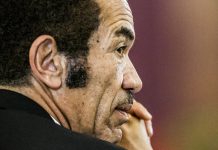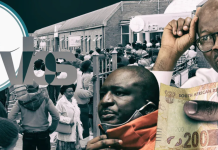By Shinovene Immanuel | 28 October 2019
A NAMIBIAN lawyer warned the government in 2015 that the Kora music awards’ draft contract – facilitated by former attorney general Sacky Shanghala’s office – had several problematic loopholes and an illegal clause.
The state-owned Namibia Tourism Board (NTB) paid Benin businessman Ernest Adjovi N$23 million in 2015 to host the music awards that never took place. It turned out that Adjovi insisted that they pay the money into a bank account in Ivory Coast.
The government is now suing Adjovi to pay back the money.
Environment minister Pohamba Shifeta, the NTB and its private lawyers Kangueehi and Kavendjii Inc are pointing fingers at Shanghala for ignoring their advice to tighten the Kora contract, which had up to seven clauses in favour of Adjovi.
Shanghala, now the justice minister, issued a statement on Friday, denying any wrongdoing. He believes that he is being made a scapegoat for this scandal, and “all Namibian problems”.
Shanghala’s office – the government’s chief legal adviser at the time – drafted and scrutinised the N$23 million contract.
Sources said the attorney general’s office cornered the NTB to deal with them, instead of using private lawyers.
The NTB obliged, but later asked their private lawyers Kangueehi and Kavendjii around November 2015 to scrutinise the draft contract from the attorney general’s office.
ADVICE IGNORED
Lawyer Kaijata Kangueehi from Kangueehi and Kavendjii Inc wrote a legal opinion for NTB on 25 November 2015, warning the government about several loopholes in the draft.
“We have noted the concern of the NTB that the bank account should be one in Namibia. We deem this concern legitimate,” he said.
He suggested that the money be paid in Namibia since Adjovi did not have operations in Namibia.
“In his email of 24 November 2015, Adjovi is adamant that they should use the Ivorian bank account,” Kangueehi said.
Shanghala’s office did not insert a clause for the money to be paid in Namibia, despite Kangueehi’s advice.
Kangueehi was also concerned that the NTB did not have the N$23 million.
“The overriding concern from the NTB (rightly so) [is] where the funding shall come from. One concludes that the NTB is not in a position to finance this project,” he added.
Kangueehi said the government would have to pay the NTB the money through a loan or sponsorship.
“Unless and until a sponsorship commitment (in writing) is made, the NTB will not and should not enter into the agreement with Mundial. If it does, then it risks breach of contract and a possible lawsuit,” he said. Kangueehi said the agreement also contained a clause that said “all the contractual provisions are reasonable and fair”.
“It attempts to restrict the party’s ability to sue on the basis of the agreement. A clause of this nature is unreasonable, and unduly restricts a party’s rights under common law,” the lawyer said.
Kangueehi added that “one can argue that, by accepting the above clause, a party is essentially signing away its right to sue the other in the event there are discrepancies in the agreement”.
NTB lawyers furthermore questioned a clause that made it compulsory for the government to sponsor the awards.
“In the absence of sufficient sponsorship, Mundial [Adjovi’s company] has no obligation to host the awards ceremony. The foremost question is: what happens to those contributions/sponsorships that are already in place?” he asked.
The draft agreement did not have a refund clause, either.
“I have perused the agreement, and have not seen a provision that entitles the NTB to a refund in the event the awards do not materialise. The said clause exposes the NTB in the event that the ceremony does not materialise,” Kangueehi continued.
He was also worried about a clause in the draft agreement stating that the NTB would “sponsor” N$23 million for Adjovi to host the controversial awards in Namibia.
Kangueehi – now an acting High Court judge – warned that the NTB did not have powers for “sponsorships, grants or donations”.
“Any agreement that purports to clothe the NTB with such powers may be ultra vires [illegal] and a nullity,” Kangueehi said.
The word sponsorship was later removed from the contract before it was signed, but sources pointed to this episode as evidence that certain government officials wanted to make it easier for Adjovi to get off the hook.
A copy of the agreement, seen by The Namibian, shows that the NTB paid N$23 million for the music awards to carry 26 Namibian tourism marketing video clips on 30 international television stations. They would show these clips two months before the awards event.
NTB’s private lawyers said the contract was also vague on this.
“We deem it sacrosanct that the relationship between the given channels (TV and radio) and Mundial be clearly defined. The said relationship must provide a remedy in the event that the agreed channels do not grant the NTB the agreed viewership,” Kangueehi stated.
According to him, “one must avoid an instance where (in the event of a breach) Mundial and the channels (TV and radio) will pass the buck to each other for such breach”.
Shanghala wrote to Shifeta a week after Kangueehi’s legal opinion, informing him of the changes to the draft contract, but he excluded key recommendations suggested by NTB’s lawyers. The NTB paid the N$23 million a week after that letter.
Shifeta, the NTB and Kangueehi were not reachable for comment. Sources said the NTB could issue a statement this week.
SHANGHALA SHIFTS BLAME
The under-fire Shanghala issued a statement last week, denying blame.
“Firstly, I only became involved in Kora towards its dwindling, final moments. It is simply not true that the agreement was crafted by the attorney general,” he said.
Shanghala insisted that he had a meeting regarding the Kora awards at the parliament restaurant “with the NTB, their lawyer and minister Shifeta, in which I proclaimed, after having heard that monies were paid in advance and the show would not materialise (as it factually did not), that the money was gone, and that if I were the NTB, I would accept that and approach treasury to report it as a loss,” the justice minister said.
He said reputable lawyers represented Adjovi and the NTB, and were “capable of drafting and negotiating agreements on behalf of their clients in accordance with the instructions of their clients”.
He said the court case was nothing but “a waste of time to save face and create the impression that an effort was made, yet without realisable assets in this jurisdiction to be able to actually recover the money, and I am yet to be proven otherwise”.
Shanghala pushed for an out-of-court settlement with Adjovi.
“I suggested that one could engage the proprietors of the Kora awards ceremony to return monies paid, thereby settling the matter. I held the view then and still do now that trying to recover those amounts may well cost nearly similar quantities, given the exchange rates, in legal fees in Europe”.
Adjovi only offered to pay N$7 million of the N$23 million in instalments.
“I am not the one who directed that payment be made in advance, and it would be prudent for all involved to take responsibility for their own deeds,” Shanghala added.






